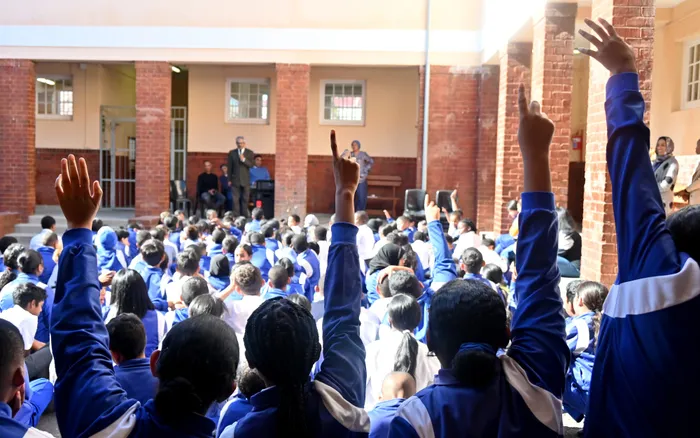
Financial Crisis Deepens at Gauteng Department of Education as Service Providers Go Unpaid
Image: Ayanda Ndamane
The ongoing financial crisis engulfing the Gauteng Department of Education (GDE) has reached a critical point, with security service providers and school meal suppliers raising alarm over months of unpaid invoices, threatening the safety and well-being of learners across the province.
Security firms contracted to protect high-risk schools have reportedly not received payment for several months—some outstanding since October 2024, with the bulk unpaid since April 2025.
As a result, these providers were instructed to withdraw their security personnel by the end of June 2025, leaving vulnerable schools exposed to crime and violence.
Despite multiple reassurances, a security service provider speaking to IOL on Wednesday voiced frustration over the department's failure to fulfill its financial obligations.
"Instead, service providers were instructed to withdraw all security guards at the end of June 2025, even though payments remain outstanding.
“This decision has left many high-risk schools without protection, exposing learners, educators, and school infrastructure to crime, vandalism, and violence."
He further revealed the devastating impact on small businesses and employees:
"Hundreds of security guards, many of whom are breadwinners, have been left unpaid and unemployed due to the Department’s failure to act responsibly.
“The GDE’s repeated dishonesty and lack of accountability have destroyed livelihoods and compromised the safety of Gauteng’s most vulnerable schools."
Calling for immediate action, the provider urged the department to demonstrate transparency, and settle all outstanding payments without delay.
In response, GDE spokesperson Steve Mabona acknowledged the financial difficulties but stressed that steps are underway to rectify the situation.
“Necessary processes are underway to ensure that security service providers are remunerated for their outstanding invoices."
Mabona added that private security services in identified high-risk schools have been terminated, but assured the public that there were plans to address this.
"The GDE is currently in partnership with the Gauteng Department of Community Safety to ensure that patrollers and traffic wardens are deployed to identified schools accordingly."
Brutal incidents are emerging across various provinces in the country, with Learners and teachers facing stabbings, mob brawls, gang fights, and deep psychological scars. At the same time, school safety systems buckle under the pressure.
On August 22, a 17-year-old Grade 10 learner at Trenance Park Secondary School in the Pinetown District, KwaZulu-Natal, was stabbed in the neck with a kitchen knife by two Grade 8 learners during school hours.
Clinical and sports psychologist Dr Keitumetse “Tumi” Mashego called for schools to deploy multidisciplinary support teams to address the challenge.
“Teachers need debriefing as well because their work is stressful and puts them at risk for burnout.”
Meanwhile, the crisis is compounding as meal service suppliers for schools in Gauteng have also raised grave concerns over unpaid invoices and alleged corruption within the province’s school nutrition programme.
Lisa Sukdev, spokesperson for affected providers, told IOL on Tuesday that irregular procurement and payment processes have put thousands of pupils at risk of going hungry due to prolonged non-payment.
“The business of school feeding has become extremely expensive to maintain. Service providers are forced to finance supplies through overdrafts and loans, yet payments remain irregular.”
“Many suppliers are running out of resources and cannot continue supplying meals," Sukdev revealed.
Mabona explained that Gauteng’s extension of the National School Nutrition Programme (NSNP) to quintile 4 and 5 schools—historically fee-paying institutions—has strained resources due to the increasing number of vulnerable learners needing subsidised meals.
“The rapid growth in learners needing nutrition support combined with budget reductions has caused payment delays to some service providers," Mabona said, citing socio-economic shifts as a key pressure point.
thabo.makwakwa@inl.co.za
IOL Politics